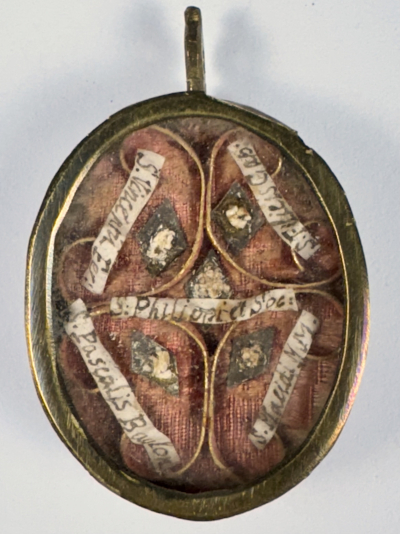Saint Philip Romolo Neri, (Italian: Filippo Romolo Neri; † 1595), known as the Apostle of Rome, was an Italian priest noted for founding a society of secular clergy called the Congregation of the Oratory of Filippo Neri. Patron of Rome, Mandaluyong, US Special Forces, Institute of Christ the King Sovereign Priest, laughter, humor, and joy.
Saint Vincent Ferrer, O.P., (†1419) was a Valencian Dominican friar, who gained acclaim as a missionary and a logician who was canonized by Pope Calixtus III in 1455. His feast day is celebrated on 5 April. He is a holy patron of builders, construction workers, plumbers, fishermen, and orphanages.
Saint Paschal Baylon (†1592) is a saint in the Roman Catholic Church noted for his strict austerities he imposed upon himself and his love for and compassion towards the ill. He is known for his strong and deep devotion to the Eucharist. Pope Paul V beatified him in 1618 and Pope Alexander VIII canonized him in 1690. He is known as the "Seraph of the Eucharist" and is the patron saint of Eucharistic congresses and Eucharistic associations. His feast day is commemorated on May 17.
Saint Felix of Cantalice, O.F.M. Cap. (†1587) was an Italian Capuchin friar of the 16th century. Felix is usually represented as holding in his arms the Infant Jesus, because of a vision he is said to have had, when the Blessed Virgin Mary appeared to him and placed the Divine Child in his arms. Pope John Paul II observed that Felix is "shown bearing the Infant Jesus in his arms because in bearing the burdens of the needy he had carried in his arms the poor Christ himself." Canonized by Pope Clement XI in 1712, he was the first Capuchin friar in the history of the Order to be canonized. His feast day is celebrated on the Calendar of Saints of the Franciscan Order on May 18.
Saint Eustace Placidas (†118) was a pagan Roman general, who converted to Christianity after he had a vision of the cross while hunting and was martyred at the command of emperor Hadrian. After the death of Trajan, he and his family were martyred under Hadrian for refusing to sacrifice to pagan Roman gods. He was venerated in the Byzantine Church from at least the 7th century. His veneration is attested for the Latin Church for the 8th century, but his rise to popularity in Western Europe happened in the high medieval period, during the 12th to 13th centuries. His feast day, both in Eastern and Western tradition, is on 20 September.






 Change language to English
Change language to English